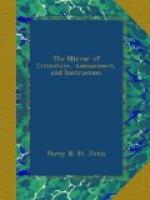Flax is not uncommon in the greenhouses about Philadelphia, but we have not heard of any experiments with it in the open air.—Encyclopaedia Americana.
The Schoolmaster wanted in the East.—Mr. Madden, in his travels in Turkey, Egypt, Nubia, and Palestine, says:—“In all my travels, I could only meet one woman who could read and write, and that was in Damietta; she was a Levantine Christian, and her peculiar talent was looked upon as something superhuman.”
La Fontaine had but one son, whom, at the age of 14, he placed in the hands of Harlay, archbishop of Paris, who promised to provide for him. After a long absence, La Fontaine met this youth at the house of a friend, and being pleased with his conversation, was told that it was his own son. “Ah,” said he, “I am very glad of it.”
Universal Genius.—Rivernois thus describes the character of Fontenelle: “When Fontenelle appeared on the field, all the prizes were already distributed, all the palms already gathered: the prize of universality alone remained, Fontenelle determined to attempt it, and he was successful. He is not only a metaphysician with Malebranche, a natural philosopher with Newton, a legislator with Peter the Great, a statesman with D’Argenson; he is everything with everybody.”
Forest Schools.—There are a number of forest academies in Germany, particularly in the small states of central Germany, in the Hartz, Thuringia, &c. The principal branches taught in them are the following:—forest botany, mineralogy, zoology, chemistry; by which the learner is taught the natural history of forests, and the mutual relations, &c. of the different kingdoms of nature. He is also instructed in the care and chase of game, and in the surveying and cultivation of forests, so as to understand the mode of raising all kinds of wood, and supplying a new growth as fast as the old is taken away. The pupil is too instructed in the administration of the forest taxes and police, and all that relates to forests considered as a branch of revenue.
The Weather.—Meteorological journals are now given in most magazines. The first statement of this kind was communicated by Dr. Fothergill to the Gentleman’s Magazine, and consisted of a monthly account of the weather and diseases of London. The latter information is now monopolized by the parish-clerks.
Goethe.—The wife of a Silesian peasant, being obliged to go to Saxony, and hearing that she had travelled (on foot) more than half the distance to Goethe’s residence, whose works she had read with the liveliest interest, continued her journey to Weimar for the sake of seeing him. Goethe declared that the true character of his works had never been better understood than by this woman. He gave her his portrait.
Liverpool and Manchester Railway.—The Company has reported the following result:
Passengers entered in the Company’s
books during the half-year
ending June 30, 1831
L188,726




